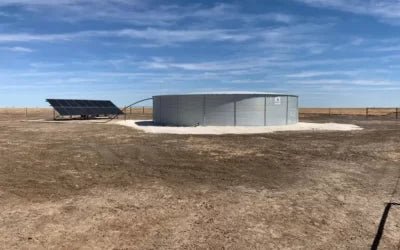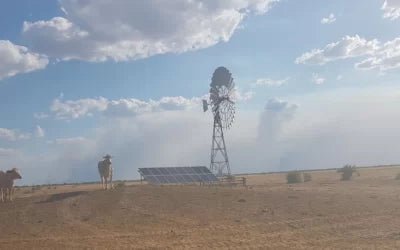Farmers and station owners across Australia often face the challenge of water scarcity and droughts, which is why maintaining a consistent and secure water supply is a major priority. A stable water supply ensures the sustainability of farms, ensuring crops and livestock can flourish.
An increasing number of farmers are adopting innovative technology, such as farm water tanks combined with solar pumps to ensure a dependable water source that adequately supports their farming endeavours.
In this comprehensive article, we examine the significance of water tanks, exploring their benefits and the essential considerations to uphold when selecting a water tank.
Join us as we unveil how these handy tools are transforming Australian agriculture, and paving the way for more sustainable farming practices you could explore.
What Is a Water Tank?
A water tank is a container purposefully designed to securely store large volumes of water. They come in various shapes, sizes, and materials, suited to a variety of specialised uses.
For instance, rainwater tanks harvest rainwater, and stock water tanks provide drinking water to livestock, such as cows and horses. There are also water tanks designed for irrigating crops, dowsing systems, recycling water, and so forth.
Water tanks mainly collect and store water for later use, especially in areas where water is a limited or unreliable resource. From farmlands to off-grid homes, these tanks are essential for effective water management and conservation for domestic, agricultural, commercial and industrial purposes.

5 Types of Water Tanks
Discover your options below:
Polyethylene (Poly) Tanks
Poly tanks are made from UV-resistant polyethylene plastic, making them ideal for sunny climates. Their resistance to the sun prevents algae from growing within the tank, ensuring maintained water quality.

Bladder, or pillow, tanks are flexible bags that people can use to contain potable (drinking) water or wastewater. To maintain water quality, these unique tanks contract to prevent the growth of bacteria.
Steel Tanks
Steel tanks are among the most durable water tanks. Farmers often use these robust vessels for large-scale industrial or commercial applications like agricultural irrigation and holding corrosive liquids.
Agricultural professionals commonly treat steel tanks with rubber coatings and polymer paints to prevent rust and corrosion. The treatment creates a barrier between corrosion and rust inducers, such as water, oxygen, and soil.
Concrete Tanks:
Concrete tanks are sturdy and long-lasting water storage solutions. They can be installed above or below the ground, are particularly celebrated for their fire resistance and ability to withstand environmental elements, such as heat and corrosive soil.
Aside from water storage, these tanks are additionally used for sewage treatments, oil-water separation, rainwater harvesting, and silt traps.
Fibreglass Tanks:
Fibreglass is a non-corrosive material, making fibreglass tanks excellent for underground installation. These versatile water storage vessels are ideal space savers, allowing large volumes of water storage. Farmers can use them to store potable water, rainwater, and wastewater.
Water Tank Applications for Farms
Water tanks serve diverse agricultural applications, making them indispensable assets for farmers. Firstly, water tanks provide a reliable flow of drinking water to livestock, supporting the well-being of animals and animal husbandry practices.
Water tanks also allow farmers to collect and conserve rainwater runoff, making them exceptionally resourceful while reducing the reliance on unpredictable rainfall.
Thirdly, water tanks support the function of irrigation systems, encouraging controlled crop watering, which facilitates high crop yield and overall farm productivity.
What to Consider When Buying a Water Tank
Correctly sizing your water tank will ensure it adequately meets your water requirements and sufficiently supports your agricultural endeavours. Here’s an overview of steps to consider when sizing a water tank:
- Calculate your water demand by assessing different agricultural activities, such as irrigation.
- Obtain rainfall data to calculate the amount of collectable water.
- Determine a desired storage period, such as the number of days you need the water supply to last.
- Consider tank efficiency to ensure factors such as evaporation and water loss don’t implement the efficiency of your tank.
- Calculate your required tank capacity to understand your water tank’s approximate size. You can determine your required tank capacity with this formula: Average Daily Water Usage x Number of Days Between Rainfalls.
- Based on your calculations and requirements, determine which type of tank will best serve your farming practices.
- Consult with professionals to determine more complex water needs and estimate a budget in accordance with an installation quote.

Why Solar Pumps Work Well for Water Tanks
Farmers primarily utilise them for water tanks by drawing water from different sources, such as boreholes or wells, and pumping water into storage tanks. They can apply the stored water to various activities, such as livestock watering or irrigation.
The synergy between solar pumps and water tanks enable farmers to harness the sun’s renewable energy, making them cost-effective, environmentally friendly, and efficient. Let’s break this down further:
Water sources, including dams or reservoirs, often lose a significant amount of water, meaning farmers subsequently have to use more energy to pump more water into their tanks, ensuring they remain sufficiently full. This often incurs costly electricity bills.
Because solar pumps harness the sun’s renewable energy, they provide farmers with a clean energy source that’s simultaneously affordable to run, meaning extra power for a leaky water source won’t present as much of an issue as traditional pumps that utilise grid electricity.
LORENTZ offers various high-performing solar pumps, such as Submersible (Bore) Pumps and Surface Water Pumps. These provide farmers with optimal water supply, especially in dryer regions, while simultaneously allowing easy water storage.
5 Benefits of Using Solar Pumps for Water Tanks
Review the advantages below:
Environmentally Friendly
Because solar pumps use the sun’s renewable energy, they don’t emit any greenhouse gas emissions, minimising your carbon footprint.
Off-Grid Capability
Solar pumps operate independently from the electrical grid, making them ideal for remote/off-grid farms with limited access to conventional electricity.
Cost Effective
Because solar pumps are independent of grid electricity, your operational expenses are significantly reduced.
Drought Resilience
Through steady, automated water pumping, your farm’s efficiency will drastically improve, ensuring a controlled water supply during dry spells.
Simple Installation & Maintenance
Solar pumps require significantly fewer installation components than conventional pumps, making them reasonably easy to install. Additionally, because they have fewer parts, solar pumps present lower maintenance, and therefore reduced downtime.
The Bottom Line…
Water tanks enhance agricultural water management and facilitate enhanced resilience against droughts, promoting the overall sustainability of farms.
Integrating solar pumps into water tanks allows you to transport and store water from different sources efficiently, ensuring a reliable supply during drier weather. If you wish to take control of your farming with solar pumps, you can find a dealer here.







